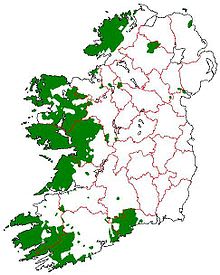| Pages in topic: < [1 2 3 4] > | Does a language stop evolving if it's over-reliant on loanwords? Thread poster: Zolboo Batbold
|
|---|
Heinrich Pesch 
Finland
Local time: 21:14
Member (2003)
Finnish to German
+ ...
| Much depends on us translators | Nov 21, 2021 |
Only we are in a position to introduce newly coined words into our language. Its a never ending struggle of course, and the small victories go mostly unnoticed by the public. Some languages are more fit for creating new words than others. Loans come and go, some stay, some disappear with time.
| | | |
Matthias Brombach wrote:
What about Gaelic in Wales and Scotland? Is it still spoken naturally and in a modern context, or only by elder people who still master it as their true native language, and not just because they keep it alive because they want to?
Matthias, Welsh (not Gaelic) is very much alive and kicking of its own accord. I’ve lived in Welsh-speaking Wales for 25 years and my son lives his life almost entirely in Welsh despite being “Wenglish”. My kids did all their education in Welsh. Obviously every product in the supermarket is labelled in English, but there are plenty of young people I know who are far more comfortable speaking Welsh than English, and not just farmers.
Whether or not it is a waste of money translating absolutely everything into Welsh and employing interpreters for bilingual meetings, when everyone understands and speaks English perfectly well, is a political hot potato.
The pay is appalling though, I hear.
| | | | Lingua 5B 
Bosnia and Herzegovina
Local time: 20:14
Member (2009)
English to Croatian
+ ...
When I was in Wales I was surprised at how many people are using Welsh in public places, even younger folks.
| | | | Tom in London
United Kingdom
Local time: 19:14
Member (2008)
Italian to English
| the Gaeltacht | Nov 22, 2021 |
Irish is spoken as a first language in the areas shown. It is not a first language everywhere because in the past, the British banned the use of Irish. But today all Irish children learn Irish in school, except in the North, which is still under British administration. Most Irish people speak some Irish but not as a first language. I don't speak it because I grew up in the North and was not taught it. I'm trying to learn bits of it. There is a large body of literature and poetry that only exist... See more Irish is spoken as a first language in the areas shown. It is not a first language everywhere because in the past, the British banned the use of Irish. But today all Irish children learn Irish in school, except in the North, which is still under British administration. Most Irish people speak some Irish but not as a first language. I don't speak it because I grew up in the North and was not taught it. I'm trying to learn bits of it. There is a large body of literature and poetry that only exists in the Irish language- and many contemporary writers write in Irish.
One of the interesting things about the map is the tiny piece of green in the north-east. This is the Glens of Antrim, where Gaelic Scotland is very close, visible across the sea.

[Edited at 2021-11-22 07:35 GMT] ▲ Collapse
| | |
|
|
|
matt robinson 
Spain
Local time: 20:14
Member (2010)
Spanish to English
| Standard language of today is new usage of yesteryear | Nov 22, 2021 |
At what moment should a language be frozen and deemed "standard" or "official"? The expansion of a language to include new terms for existing or new concepts is nothing new. This is evident from the briefest of journeys through an etymological dictionary. In English, for example, find me a word that does not have its roots in another language. These were not imported into English, but are an integral part thereof and became so for a variety of reasons, just as those "source" languages underwent ... See more At what moment should a language be frozen and deemed "standard" or "official"? The expansion of a language to include new terms for existing or new concepts is nothing new. This is evident from the briefest of journeys through an etymological dictionary. In English, for example, find me a word that does not have its roots in another language. These were not imported into English, but are an integral part thereof and became so for a variety of reasons, just as those "source" languages underwent and undergo (if still used) their own evolutionary processes. ▲ Collapse
| | | | Lingua 5B 
Bosnia and Herzegovina
Local time: 20:14
Member (2009)
English to Croatian
+ ...
| Far to the West. | Nov 22, 2021 |
Tom in London wrote: Irish is spoken as a first language in the areas shown. It is not a first language everywhere because in the past, the British banned the use of Irish. But today all Irish children learn Irish in school, except in the North, which is still under British administration. Most Irish people speak some Irish but not as a first language. I don't speak it because I grew up in the North and was not taught it. I'm trying to learn bits of it. There is a large body of literature and poetry that only exists in the Irish language- and many contemporary writers write in Irish. One of the interesting things about the map is the tiny piece of green in the north-east. This is the Glens of Antrim, where Gaelic Scotland is very close, visible across the sea.  [Edited at 2021-11-22 07:35 GMT]
Interesting distribution. The Irish speaking areas are the farthest from the UK, far to the West. The farthest from the influence.
| | | | Tom in London
United Kingdom
Local time: 19:14
Member (2008)
Italian to English
| There's a reason for that | Nov 22, 2021 |
The English forced the Irish away from Dublin and the east. Many of those who didn't die of hunger kept going west until they came to America.
[Edited at 2021-11-22 11:47 GMT]
| | | | Tom in London
United Kingdom
Local time: 19:14
Member (2008)
Italian to English
|
|
|
This must be a special OED definition of the word "new". I can remember playing Chinese chequers when I was a kid, and I'm sure P.G. Wodehouse wrote quite a lot about about a gentlemen’s club.
However, there is certainly plenty of evidence in that list for the assimilation of words from other languages and cultures.
| | | | Tom in London
United Kingdom
Local time: 19:14
Member (2008)
Italian to English
| Yes- I too was puzzled by that | Nov 22, 2021 |
Philip Lees wrote:
..... P.G. Wodehouse wrote quite a lot about about a gentlemen’s club.
.
| | | | | The Japanese language is evolving in the wrong way | Dec 3, 2021 |
That all languages evolve, albeit variably from country to country, is a fact. However, those who do not know the Japanese language will find grasping the linguistic monstrosities that have been being bred for some time here very difficult.
You walk into a shoe shop and ask "I would like those *black shoes*" (黒い靴, or kuroi kutsu), and they would stare at you as if they didn't quite understand: "Ah, ano *burakku shūzu* desu-ka" (transliterated from black shoes).
... See more That all languages evolve, albeit variably from country to country, is a fact. However, those who do not know the Japanese language will find grasping the linguistic monstrosities that have been being bred for some time here very difficult.
You walk into a shoe shop and ask "I would like those *black shoes*" (黒い靴, or kuroi kutsu), and they would stare at you as if they didn't quite understand: "Ah, ano *burakku shūzu* desu-ka" (transliterated from black shoes).
You walk into a car dealer and say "I would like a *red car*" (赤い車, or akai kuruma), and they would very likely say "Ah, *reddo cā* desune!" (transliterated from red car).
I could go on with hundreds of such examples, even worse from the linguistic point of view. (It often makes us foreigners laugh when new, all-Japanese concepts that are born today are inaugurated directly with their funny English and transliterated with the alphabet they have invented specifically for imported words).
While it is true that the Japanese language too has been influenced by other languages—mainly Chinese—before Japan chose to "westernise", this evolution happened by necessity, naturally and over centuries.
But, as the two examples above make clear, this is no longer natural evolution. The Japanese are gradually giving up their language, just as they have given up their Asian-ness. It is no longer evolution triggered by natural interaction with other languages over time, but evolution forced by pure xenophilic desire. And it's even more ludicrous if you think that the Japanese are the least proficient in English among all Asian countries.
This is why I fear that in a not so distant future the Japanese might start speaking like this:
ザ・ジャパニース・ドリンク・ツウ・マッチ, to be read za japanīzu dorinku tsū macchi, the "evolved" Japanese version of "The Japanese drink too much".
[Edited at 2021-12-03 04:33 GMT]
[Edited at 2021-12-03 07:35 GMT] ▲ Collapse
| | | | Zolboo Batbold 
Italy
Local time: 20:14
Member (2021)
English to Mongolian
+ ...
TOPIC STARTER SITE LOCALIZER | I feel the same way | Dec 3, 2021 |
Mario Cerutti wrote:
That all languages evolve, albeit variably from country to country, is a fact. However, those who do not know the Japanese language will find grasping the linguistic monstrosities that have been being bred for some time here very difficult.
You walk into a shoe shop and ask "I would like those *black shoes*" (黒い靴, or kuroi kutsu), and they would stare at you as if they didn't quite understand: "Ah, ano *burakku shūzu* desu-ka" (transliterated from black shoes).
You walk into a car dealer and say "I would like a *red car*" (赤い車, or akai kuruma), and they would very likely say "Ah, *reddo cā* desune!" (transliterated from red car).
I could go on with hundreds of such examples, even worse from the linguistic point of view. (It often makes us foreigners laugh when new, all-Japanese concepts that are born today are inaugurated directly with their funny English and transliterated with the alphabet they have invented specifically for imported words).
While it is true that the Japanese language too has been influenced by other languages—mainly Chinese—before Japan chose to "westernise", this evolution happened by necessity, naturally and over centuries.
But, as the two examples above make clear, this is no longer natural evolution. The Japanese are gradually giving up their language, just as they have given up their Asian-ness. It is no longer evolution triggered by natural interaction with other languages over time, but evolution forced by pure xenophilic desire. And it's even more ludicrous if you think that the Japanese are the less proficient in English among all Asian countries.
This is why I fear that in a not so distant future the Japanese might start speaking like this:
ザ・ジャパニース・ドリンク・ツウ・マッチ, to be read za japanīzu dorinku tsū macchi, the "evolved" Japanese version of "The Japanese drink too much".
[Edited at 2021-12-03 04:33 GMT]
Italy is facing the same problem with Itanglese. Global domination of English? And we're not even talking about the authentic Shakespearean English. The English that is spreading throughtout the world is the Capitalistic English, that glorifies consumerism.
| | |
|
|
|
Tom in London
United Kingdom
Local time: 19:14
Member (2008)
Italian to English
Zolboo Batbold wrote:
Italy is facing the same problem with Itanglese. Global domination of English? And we're not even talking about the authentic Shakespearean English. The English that is spreading throughtout the world is the Capitalistic English, that glorifies consumerism.
Yes- and the problem is that many English words are being adopted into Italian WITH THE WRONG MEANING ! Such as "smart working" (which Italians think means "working from home") and is pronounced "zmawokin".
[Edited at 2021-12-03 08:25 GMT]
| | | | | Italy and Japan | Dec 3, 2021 |
Zolboo Batbold wrote:
Italy is facing the same problem with Itanglese. Global domination of English? And we're not even talking about the authentic Shakespearean English. The English that is spreading throughtout the world is the Capitalistic English, that glorifies consumerism.
I don't know if it's the capitalist aspiration that leads to this strange phenomenon (maybe partly yes, because in fact the western capitalist model is still strong and goes hand in hand with cultural globalism).
I think there may also be other reasons linked to the geo-political history of the two countries, so different but common in creating a new lifestyle mirage.
Italy, for example, suffered enormous and constant foreign influences until the Risorgimento, in the nineteenth century, while Japan, after a rather long period of self-seclusion, discovered that the Western model was more modern and fascinating than the Chinese one, its first and lasting love, and so began to copy it in every way, creating this curious cultural jumble which for the Japanese is the ideal combination of tradition and, precisely, modernity.
Is there the same problem in Mongolia today? Is the Mongolian language experiencing a major linguistic evolution from other languages?
| | | | Zolboo Batbold 
Italy
Local time: 20:14
Member (2021)
English to Mongolian
+ ...
TOPIC STARTER SITE LOCALIZER
Mario Cerutti wrote: Zolboo Batbold wrote:
Italy is facing the same problem with Itanglese. Global domination of English? And we're not even talking about the authentic Shakespearean English. The English that is spreading throughtout the world is the Capitalistic English, that glorifies consumerism. I don't know if it's the capitalist aspiration that leads to this strange phenomenon (maybe partly yes, because in fact the western capitalist model is still strong and goes hand in hand with cultural globalism). I think there may also be other reasons linked to the geo-political history of the two countries, so different but common in creating a new lifestyle mirage. Italy, for example, suffered enormous and constant foreign influences until the Risorgimento, in the nineteenth century, while Japan, after a rather long period of self-seclusion, discovered that the Western model was more modern and fascinating than the Chinese one, its first and lasting love, and so began to copy it in every way, creating this curious cultural jumble which for the Japanese is the ideal combination of tradition and, precisely, modernity. Is there the same problem in Mongolia today? Is the Mongolian language experiencing a major linguistic evolution from other languages?
Yes, Mongolian language is under pressure from foreign languages. Historically, Mongolia was a satellite state of the Soviet Union from the 1920´s to 90's. During this period it was heavily influenced by the Russian language. After the collapse of the Sovien Union, Mongolia adopted a democratic regime, and opened up to the West, so English words became more and more fashionable.
However, the situation in Mongolia is very different from Italy. Under the Communist regime, Mongolian official writing system was changed from the traditional Mongolian script (also called Khudum) to the Cyrillic script. So you can imagine the negative impact this must have caused on language and culture in general. After the 1990's an attempt was made to revive the traditional script but it was not very successful. Last year in 2020, the government announced the decision to implement double writing system (Cyrillic and Khudum) by year 2025. How successful it will be, only time will tell.
[Edited at 2021-12-03 09:44 GMT]
| | | | | Pages in topic: < [1 2 3 4] > | To report site rules violations or get help, contact a site moderator: You can also contact site staff by submitting a support request » Does a language stop evolving if it's over-reliant on loanwords? | Trados Business Manager Lite | Create customer quotes and invoices from within Trados Studio
Trados Business Manager Lite helps to simplify and speed up some of the daily tasks, such as invoicing and reporting, associated with running your freelance translation business.
More info » |
| | CafeTran Espresso | You've never met a CAT tool this clever!
Translate faster & easier, using a sophisticated CAT tool built by a translator / developer.
Accept jobs from clients who use Trados, MemoQ, Wordfast & major CAT tools.
Download and start using CafeTran Espresso -- for free
Buy now! » |
|
| | | | X Sign in to your ProZ.com account... | | | | | |























